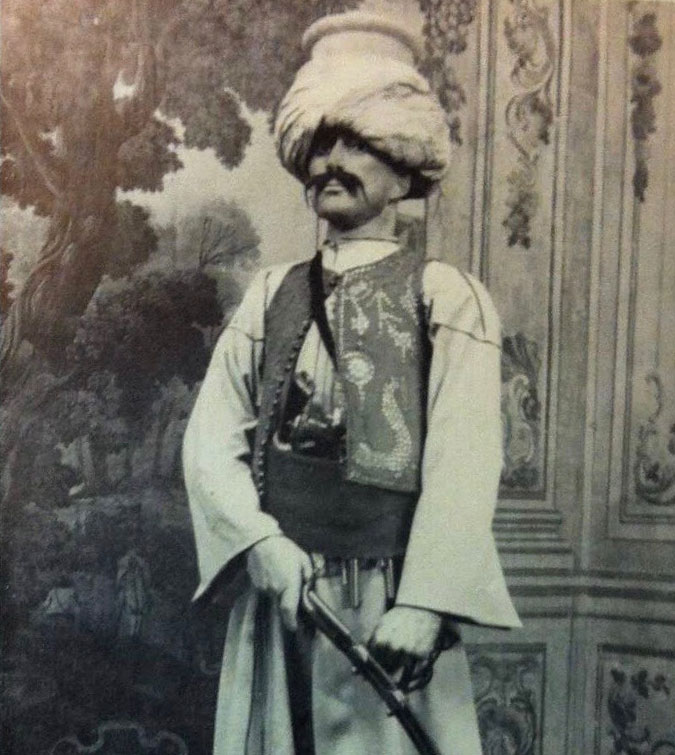A key figure in the history of Napoleon on Saint Helena, we owe him the creation of the Eau de Cologne of the Exiled Emperor. Faithful servant, discreet handyman and apostle of the Napoleonic legend, Mamelouk Ali has oriental only the title: of his real name Louis-Étienne Saint-Denis, the young man was initially intended for the notary.
A Peaceful and Privileged Youth.
His father, a former « piqueur » (a man in charge of training and exercising horses) of the stables of Versailles under Louis XVI became under the Ancien Régime horse-riding teacher, which earned him a certain notoriety. His mother being the daughter of an officer of the royal kitchens at the castle, the young Louis-Étienne received an education (which is already in itself a privilege) and moreover a conscientious education (which touches on exceptional for the time).
Well educated, the young man is sent as a notary clerk in an office in Paris, an activity whose most adventurous aspect was probably to survive from it. He remained there four years before his father, through Armand Augustin Louis Caulaincourt (1773 – 1827), diplomat and Grand Écuyer of Napoleon I, granted Louis-Étienne a place in the imperial service. In 1812 the latter is promoted as porte-arquebuse. But it was two years later, in 1814, that his life changed and offered him a place closer to the Emperor.
Louis-Étienne Saint-Denis becomes Mamluk Ali.
The Mamelukes are, as everyone knows, members of a militia formed of freed slaves in the service of sovereigns. During the Egyptian expedition (1798 – 1801), Napoleon inflicted a heavy defeat on the Mamelukes of Egypt, some of whom joined his ranks. In the summer of 1799, after his victories, a magnificent horse and his groom, a young Mamluk named Raza Roustam (1783 – 1845) were offered to Napoleon. Roustam brings a touch of exoticism that appreciates Bonaparte and quickly becomes the protégé of the general, his bodyguard and his faithful servant. Fidelity that will end during the attempted suicide of the Emperor in April 1814, the day after the signing of the Treaty of Fontainebleau (April 11 1814) which act the abdication of Napoleon and his exile on the island of Elba.
Worried that he could be accused of murder if the event was to happen again, Mamluk Roustam abandoned his benefactor. It is then Louis-Etienne Saint-Denis who takes his place of 1st Mamluk under the name of Ali, nickname he will keep until the end of his life, which was not the case of his oriental costume that he stopped wearing as soon as he arrived in St. Helena. From that day of April he never left the Emperor, to whom he showed himself devoted and indefatigable. During the exile, he befriended Louis-Joseph Marchand (1791 – 1876) with whom he endeavored to soften as much as possible the captivity of the fallen Emperor. Mamluk Ali became Longwood’s copyist and librarian of which he drew up the complete catalog. From his knowledge of the library, his resourcefulness, his intelligence and his improbable olfactory memory that we owe him the formula of Napoleon’s Eau de Cologne at St. Helena.
Do you like this article?
Like Bonaparte, you do not want to be disturbed for no reason. Our newsletter will be discreet, while allowing you to discover stories and anecdotes sometimes little known to the general public.
Congratulations!
You are now registered to our Newsletter.
The formula of remembrance.
Harvesting herbs, flowers and bark, diligently studying the books at his disposal, Mamluk Ali managed to formulate a hesperidian recipe to offer Napoleon the only olfactory comfort that he had anymore access to since his forced retirement. The Emperor’s considerable use of Cologne and the eagerness of his faithful servants to provide him with all possible means, even if they were to manufacture it themselves, are proof of importance of the fragrance in the life of Napoleon. It certainly took a number of unsuccessful attempts before reaching the much sought-after recipe. The precious formula probably contributed to the well-being of the Emperor. Thus Mamluk Ali jealously kept it all his life, so that it was found at the end of the 20th century when his personal belongings were sold during an auction sale. Sheltered in a trunk, the passionate purchaser of Napoleonic history discovered the formula, Napoleon’s unique olfactory memory. A treasure today resurrected.
Marielle Brie
Marielle Brie est historienne de l’art pour le marché de l’art et de l’antiquité et auteur du blog « Objets d’Art & d'Histoire ».
